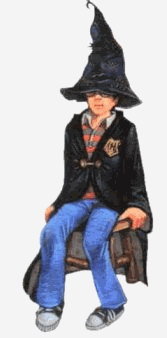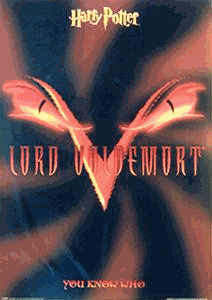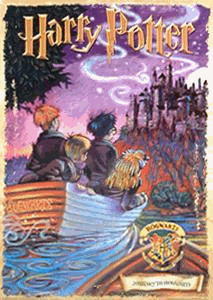 Evil
in the magical world
Evil
in the magical world Evil
in the magical world
Evil
in the magical world
Once Harry finds out he is a wizard, he learns about a world that is parallel to the one in which he has thus far lived. In it, evil works in a different way. Granted, there are remnants of Suchocki’s model of evil in the wizarding society (class struggles, prejudice against those who are not "pure" witches and wizards, etc.), but that is not what really constitutes or perpetuates evil. Instead, evil is a pronounced, tangible thing that any wizard or witch can choose to embrace.
To begin describing what constitutes evil in the wizarding world, one must first know that the existence of "magic" is presupposed. Certain people, objects and things are imbibed with magical qualities and power (though it never is really explained why). Such things existing with these qualities begin in a state of neutrality. They only possess power; it is up to a wizard or witch’s free will to discern how to use this power. One must be careful, however, in exercising their free will.
Evil can come into play with magic when a witch or wizard elects to use the power available to them illegitimately. An example of this abuse of power is when wizard chooses to practice the "Dark Arts." Though the Dark Arts are never specifically defined, there are some clues as to what constitutes them. Students learn how to fight werewolves, vampires and hags (and some creations of J.K. Rowling’s imagination) in their "Defense Against the Dark Arts" class at Hogwarts. There are also restricted books in the library about the Dark Arts—typically, such volumes contain powerful curses and spells for achieving non-altruistic ends. Hence, a wizard or witch that could be considered evil is one who abuses power to the detriment of others to achieve their own selfish ends. Evil defined in this way is embodied in the character of Lord Voldemort.
 Voldemort
was once a student at Hogwarts and had the makings of a great wizard. He was in
Slytherin, the house associated for "cunning folk" who will "use
any means to achieve their ends" (118). While not all wizards and witches
who go into Slytherin are necessarily evil, they are more prone to go towards
it. As Hagrid the Hogwarts groundskeeper comments, "There was not a single
witch or wizard who went bad who wasn’t in Slytherin" (77). Harry is
almost put into Slytherin, but begs the "Sorting Hat" to put him into
a different house (and it does). Interestingly, magical wands also link Harry
and Voldemort. Each wand has a magical power source (a hair from a unicorn’s
tale, a dragon’s heartstring, a feather from a phoenix, etc.). A phoenix gave
two tale feathers that went into two different wands—Voldemort got one, Harry
got the other. This strengthens the idea of the importance of free will in the
choice between good and evil—whereas Voldemort used the intrinsic power given
to him for evil, Harry uses that same power for good. Other than these two
pieces of information, however, the first book is pretty silent about the rest
of Voldemort’s past (most characters in the story are so afraid of him, they
won’t even speak his name much less say anything else about him—they call
him "You know Who" or "He-who-must-not-be-named"). However,
readers do know that Voldemort terrorized all in the wizarding world, but gained
followers with lines like, "there is no good and evil, there is only power,
and those to week to seek it" (291).
Voldemort
was once a student at Hogwarts and had the makings of a great wizard. He was in
Slytherin, the house associated for "cunning folk" who will "use
any means to achieve their ends" (118). While not all wizards and witches
who go into Slytherin are necessarily evil, they are more prone to go towards
it. As Hagrid the Hogwarts groundskeeper comments, "There was not a single
witch or wizard who went bad who wasn’t in Slytherin" (77). Harry is
almost put into Slytherin, but begs the "Sorting Hat" to put him into
a different house (and it does). Interestingly, magical wands also link Harry
and Voldemort. Each wand has a magical power source (a hair from a unicorn’s
tale, a dragon’s heartstring, a feather from a phoenix, etc.). A phoenix gave
two tale feathers that went into two different wands—Voldemort got one, Harry
got the other. This strengthens the idea of the importance of free will in the
choice between good and evil—whereas Voldemort used the intrinsic power given
to him for evil, Harry uses that same power for good. Other than these two
pieces of information, however, the first book is pretty silent about the rest
of Voldemort’s past (most characters in the story are so afraid of him, they
won’t even speak his name much less say anything else about him—they call
him "You know Who" or "He-who-must-not-be-named"). However,
readers do know that Voldemort terrorized all in the wizarding world, but gained
followers with lines like, "there is no good and evil, there is only power,
and those to week to seek it" (291).
There was only one man who rivaled Voldemort in power—Dumbledore, the Headmaster at Hogwarts. It was not Dumbledore who stopped Voldemort from taking over everything the first time, however. It was the baby Harry Potter, who didn’t even know he was doing battle with the strongest force of Evil wizards had seen in the present age. Though it is unclear why Harry lived through his encounter with Voldemort, it has something to do with the fact that Harry’s mother gave her life to save him. Something about that selfless act of love countered great evil.
 Eleven
years after Harry’s first meeting with Voldemort, however, Voldemort almost
comes back to power. In seeking to do so, more evidence is given to what the
wizarding world sees as evil. Voldemort shares a body and soul with one of his
followers—Quirrell—and forces him to do his bidding. For example, in an act
of pure evil, Quirrell killed a unicorn to drink its blood. Unicorn blood
prolonged Voldemort’s life, but at the expense of whatever was still left of
his soul. It is an act of pure evil because Quirrell/Voldemort destroyed
something totally innocent to achieve his own ends. It was ineffective though
Voldemort is again foiled again because he did not count on the fact that Harry
could defeat him more than once. When Harry and Quirrell/Voldemort faced off,
Quirrell/Voldemort wasn’t even able to hang onto Harry, because his hands
burned at the touch of Harry skin. As Dumbledore explained to Harry:
Eleven
years after Harry’s first meeting with Voldemort, however, Voldemort almost
comes back to power. In seeking to do so, more evidence is given to what the
wizarding world sees as evil. Voldemort shares a body and soul with one of his
followers—Quirrell—and forces him to do his bidding. For example, in an act
of pure evil, Quirrell killed a unicorn to drink its blood. Unicorn blood
prolonged Voldemort’s life, but at the expense of whatever was still left of
his soul. It is an act of pure evil because Quirrell/Voldemort destroyed
something totally innocent to achieve his own ends. It was ineffective though
Voldemort is again foiled again because he did not count on the fact that Harry
could defeat him more than once. When Harry and Quirrell/Voldemort faced off,
Quirrell/Voldemort wasn’t even able to hang onto Harry, because his hands
burned at the touch of Harry skin. As Dumbledore explained to Harry:
"If there is one thing Voldemort cannot understand, it is love. He didn’t realize that love as powerful as your mother’s for you leaves it own mark. Not a scar, no visible sign . . . to have been loved so deeply, even though the person who loved us is gone, will give us some protection forever. It is in your very skin. Quirrell, full of hatred, greed and ambition, sharing his soul with Voldemort, could not touch your for this reason. It was agony to touch a person marked by something so good" (299).
This means that even the most potent wizarding evil is not as strong as goodness or love.
After taking all of this into consideration, evil in the wizarding world is much closer to Karl Rahner and Paul Tillich’s characterization of evil (though one needs to start a comparison with a great deal of imagination). First, to start with Rahner’s thought, I would argue that he might see the created world in Harry Potter and the Sorcerer’s Stone as fundamentally good. This "goodness" would also extend to the power of magic present in the universe. After all, in Harry’s world, magic is like what electricity or nuclear power is for humans today—a force that can be harnessed for good or for evil. Looking at it this way, it is probable that for the sake of argument Rahner would thus see "magic" as fundamentally good as well (insofar as it is a part of creation). Hence, using magic (like any other part of creation) for any choice than "for God" is a turning away from God. Since there is no God per se in Harry Potter and the Sorcerer’s Stone, one must for the sake of argument say that in the wizard world, a turning away from "good" would be comparable to turning away from "God" in our own world. As such, Voldemort is the personification of this turning away in that his only goals and aims are away from good and towards himself. Voldemort’s desire to control the wizarding world through his Dark Magic is comparable to how Rahner would describe the angels’ desire to become like God by their own will. Both wanted to take into their hands the ultimate power found in God (for Rahner) and in Magic (for the wizard world). Rahner would see Voldemort as evil then, as Voldemort is good as he is created such, but then he chooses to go away from that time and time again. An opposite of this demonic narcissism exists in Harry’s mother’s sacrifice, as it is a conscious choice away from the self and towards good for the wizard world (or God for us).
Paul Tillich, on the other hand, I think would see evil characterized in another way in Harry Potter. Remember, in order to compare Tillich’s thought to the imaginary worldview presupposed in Harry Potter, one must be able to accept the wizarding world of something that falls outside of our own. Having said that, I think Tillich would see the "structures of destruction" at work in the figures of Voldemort and all of those who chose to follow him. Dumbledore’s statement to Harry is a good example of this. He tells Harry about how Quirrell, consumed with the destructive forces of greed, hatred and ambition, has destroyed himself to the point of being completely unable to come in contact with any kind of good. This is like creation’s fall into existential estrangement—humankind in their sinfulness is unable to encounter God. This is why Dumbledore also says that Voldemort cannot be killed—"not being truly alive, he cannot be killed" (298). Voldemort has no Jesus or no God in his world; hence, in surrendering his ability to choose good for the chance at ultimate power, he is in the state of eternal existential estrangement. His only hope of "redemption" would be the wizarding world’s only trace of a salvific force—the potential to do good.
A final example of this is in Dumbledore’s statement to Harry that "to the well-organized mind, death is but the next great adventure" (297). Voldemort, in denying all good, denies his ability to die and partake in this adventure. Eventually, if the book theologically proceeds the way it seems to be, Voldemort will be completely obliterated. This is the ultimate fate of the evil in the wizard world it seems—the ceasing of potential or the ceasing of the good. Tillich says a similar thing about humanity—without Jesus, creation’s structures of destruction (evil) will lead to its ultimate demise.
![]()
 To move through the
pages in order, click:
To move through the
pages in order, click:
Or go directly to the page you want:
Synopsis of the Harry Potter Stories
Good in Harry Potter as Defined by Biblical Texts